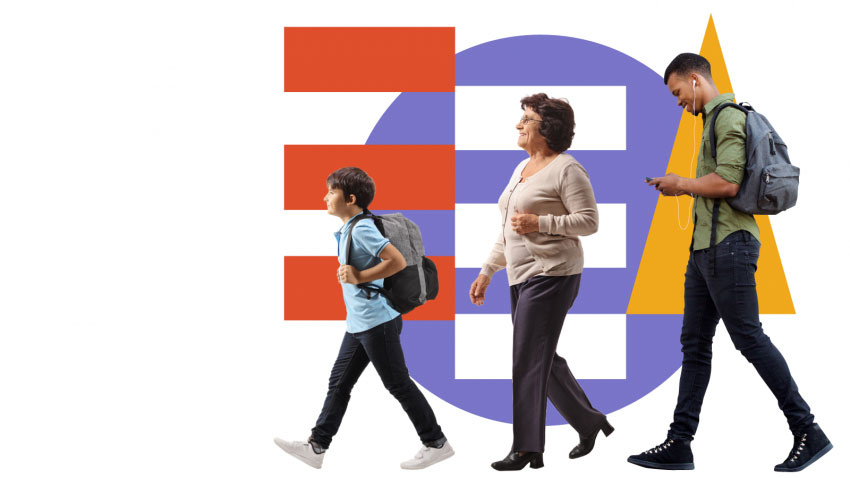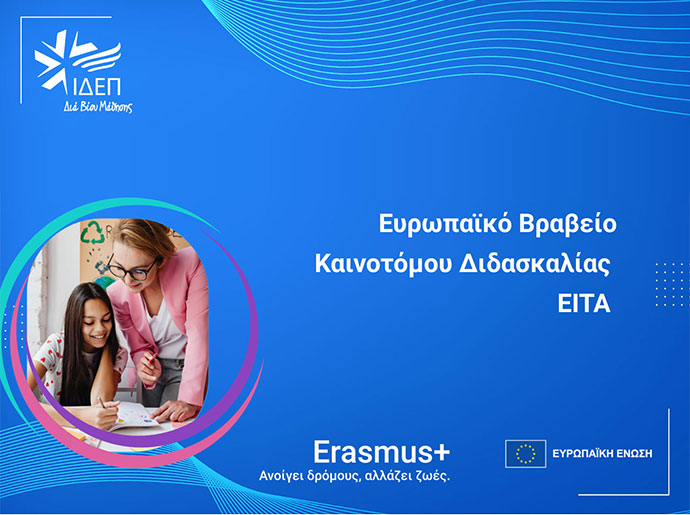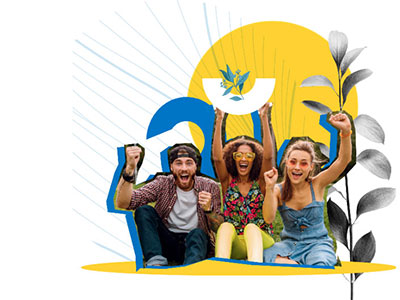European Language Label
The European Language Label is an award that encourages the development of new techniques and initiatives in the field of language learning and teaching, and fosters intercultural awareness across Europe. It is awarded to the most innovative Erasmus+ Projects that have language learning as their field of interest.
The Lifelong Learning Foundation awards the label once a year. Usually the award ceremony takes place in the autumn of each year.
The ultimate European objective is to improve the level of language teaching in Europe by supporting such initiatives at local and national level.
Submit an application for the European Language Label
The European Language Label is awarded to beneficiaries who, at the stage of submitting their final report submitted to the Lifelong Learning Institute, have expressed their interest through their final report and have answered the relevant questions in the report.
Each year the IHU evaluates the specific applications of interest for the label and communicates the results to the beneficiaries in writing. It should be noted that the evaluation for the Label and any feedback does not take place at the evaluation stage of the final report of the project but after the year under evaluation has been completed.
Issues to consider when submitting your application
The European themes for projects applying for the European Language Label in 2023-2024 are:
- supporting newly arrived migrants and displaced children and young people in their language learning needs
- professional development of teachers to enable them to address issues of inclusion and intercultural dialogue, especially given the increased linguistic diversity in the classroom
- support for projects concerning minorities and regional languages as a means of promoting equality, social cohesion and active citizenship
- language learning that supports the personal development of adult learners
Discover the winning projects
Explore the following examples of language initiatives that have already been awarded the European Language Label
- watch the video celebrating innovative language projects between 2014 and 2020 under Erasmus+ and the European Language Label
- read the publication presenting the European Language Labels awarded across Europe in 2019
Selection of Plans
Beneficiaries from both Key Actions of the Programme are eligible to participate.
Specifically from each Action the following sectors are involved:
Key Action 1: School Education, Vocational Education and Training, Adult Education
Key Action 2: School Education, Vocational Education and Training, Higher Education, Adult Education.
The Lifelong Learning Foundation awards one Project from each sector (including both Actions). Therefore, the maximum number of awards granted per year is 4.
However, the IMEP reserves the right not to proceed with an award if the nominated Projects are not judged to be of good quality.
Award
Specific information regarding the award will be announced at a later stage.
Απονέμονται μέχρι τέσσερα βραβεία ανά χώρα του Προγράμματος, ένα για καθεμιά από τις κατηγορίες:
- Προσχολική εκπαίδευση και φροντίδα
- Πρωτοβάθμια εκπαίδευση
- Δευτεροβάθμια εκπαίδευση
- Επαγγελματική εκπαίδευση και κατάρτιση
Το ΙΔΕΠ Διά Βίου Μάθησης επιλέγει τα σχέδια στη βάση των κριτηρίων επιλεξιμότητας, της ετήσιας θεματικής προτεραιότητας και των κριτηρίων επιλογής. Μετά την επιλογή των υποψηφίων σχεδίων, η Εθνική Υπηρεσία θα επικοινωνήσει με τα συντονιστικά σχολεία για να λάβει τις απαιτούμενες πληροφορίες, ώστε να προχωρήσει στην τελική επιλογή των προτεινόμενων βραβείων. Για τη διαδικασία αυτή δεν απαιτείται οποιαδήποτε ενέργεια από τους δικαιούχους.
- Κριτήρια Επιλεξιμότητας
- Θεματική προτεραιότητα για το 2024
- Κριτήρια Επιλογής
- Κριτήρια Επιλεξιμότητας
- Σχέδια των προσκλήσεων 2019 – 2023, τα οποία έχουν ολοκληρωθεί
- Σχέδια, τα οποία έχουν χρηματοδοτηθεί από την κυπριακή Εθνική Υπηρεσία και είχαν κυπριακό οργανισμό ως συντονιστή
- Σχέδια, τα οποία δεν έχουν λάβει το Βραβείο σε προηγούμενα έτη
- Σχέδια, τα οποία εμπίπτουν στη θεματική προτεραιότητα, όπως αυτή ορίζεται ετησίως από την Ευρωπαϊκή Επιτροπή
- Θεματική προτεραιότητα για το 2024
Για το 2024, η θεματική για το Ευρωπαϊκό Βραβείο Καινοτόμου Διδασκαλίας είναι “Ευημερία στο σχολείο” και συνδέεται με την υλοποίηση της πρωτοβουλίας “Διαδρομές προς τη σχολική επιτυχία”. Η φετινή θεματική προτεραιότητα διερευνά την οικοδόμηση μιας συστημικής, ολιστικής προσέγγισης για την ευημερία και τη ψυχική υγεία στα σχολεία.
- Κριτήρια Επιλογής: Χαρακτηριστικά καινοτομίας
Award criteria: the innovation characteristics
The EITA will be awarded based on the following criteria. Each criterion should be assessed on a scale from 1 (poor) to 10 (excellent):
Methodologies used | In what ways are the teaching and learning approaches elaborated and implemented in the project innovative?
|
Innovation environments | In what ways do learning environments involved in the project support innovative teaching and learning approaches? |
Teachers’ role | In what ways do teachers/educators involved in the project influence the innovative teaching and learning processes?
|
Impact and outputs | What is the impact of the innovative teaching and learning processes elaborated and implemented in the project?
|








